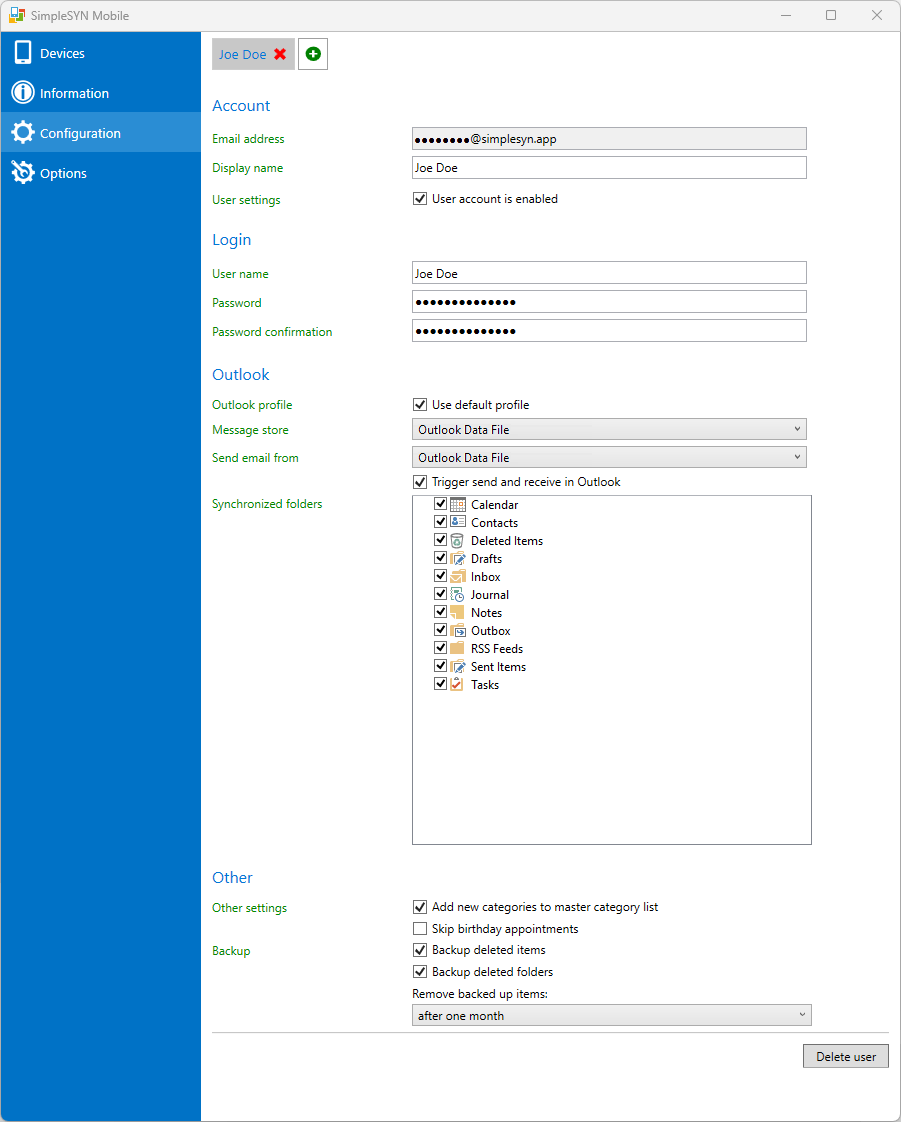Configuration
Applies to version: Version 2.x / 3.x
After the initial setup by the setup wizard, a user account is automatically created and all Outlook folders of the default data file are added for synchronization with the end device. In the Configuration area, you can adjust the synchronization if necessary and set up additional users. Each Outlook data file you want to synchronize requires its own user account.
 Figure 1: The icon after a change
Figure 1: The icon after a change
 Figure 2: SimpleSYN Mobile is ready again
Figure 2: SimpleSYN Mobile is ready again
Create another user account
Click on the "Plus" icon to add another user account. This allows you to select, for example another data file for synchronization.
 Figure 3: Creating a new user account
Figure 3: Creating a new user account
Delete a user account
Click the "red X" or "Delete user" to delete a user account. All settings of the user account are irretrievably removed.
 Figure 4: Deleting a user account
Figure 4: Deleting a user account
Configuration
 Figure 5: Configuration
Figure 5: Configuration
Account
Email address:
Contains an automatically generated email address that is required to establish a connection from your device.
Display name:
Select a display name for the user account. The display name is used to easily identify the user account, e.g., when displaying the status in “Devices”.
User settings:
Here you can activate or deactivate the user account. If the user account is deactivated, no device can establish a connection.
Login
User name:
Choose a username. The username is used to log in to SimpleSYN Mobile from the end device.
Password:
Configures the password for establishing a connection from your device. A password is required.
Outlook
Outlook profile:
Select the Outlook profile you want to synchronize. If this does not match the default Outlook profile, unselect the "Use default profile" check box. A list of available profiles is then displayed.
Message store:
Select the Outlook data file you want to synchronize (the default data file is preselected).
Send email from:
Configures the email account or email address that SimpleSYN Mobile should use for outgoing email.
Synchronized folders:
Select the Outlook folders that should be available to the end device for synchronization. The Outlook folders that are marked with a check mark have been selected for synchronization.
Other
Other settings
- Add new categories to master category list:
If this option is activated, SimpleSYN Mobile checks whether all categories used in the items are present in the master category list during synchronization. If not, SimpleSYN Movbile adds the category name to the master category list with a default color. You can manually adjust the color to match the other PCs. - Skip birthday appointments:
If this option is activated, birthdays from contacts will be skipped when syncing the calendar. This prevents birthdays from being displayed twice on Apple iOS devices and other calendar apps.
Backup:
- Back up deleted items:
With SimpleSYN default settings, deleted items are being moved by SimpleSYN into a hidden backup folder of the Outlook® data file. If this option is not activated deletions are no longer backed up. - Back up deleted folders:
With SimpleSYN default settings, deleted folders are being moved by SimpleSYN into a hidden backup folder of the Outlook® data file. If this option is not activated deletions are no longer backed up.
Remove backed up items:
Here you can specify the period of time after which the items are to be permanently removed from the backup folder.